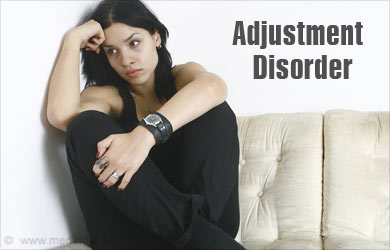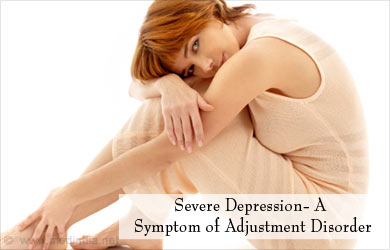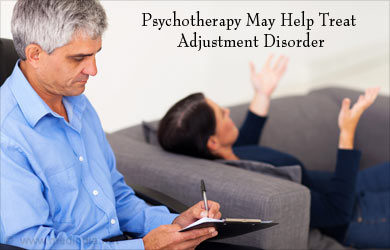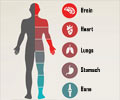- Carta MG, Balestrieri M, Murru A, Hardoy MC. Adjustment Disorder: epidemiology, diagnosis and treatment. Clinical Practice and Epidemiology in Mental Health 2009, 5:15 doi:10.1186/1745-0179-5-15
What is Adjustment Disorder?
Adjustment disorder
Adjustment disorder is usually considered less severe than other mental illnesses like major depression and bipolar disorder. The individual may also show symptoms related to disturbance of emotion and/or conduct, depressed mood, and /or anxiety.

There are several situations that can trigger an adjustment disorder. Examples include loss of job, separation from spouse, change of school, detection of a major illness like cancer etc. A normal reaction to the death of a loved one does not qualify for adjustment disorder. Adjustment disorder occurs when an incident results in severe and more than expected distress to the individual and interferes with his/her work and social life. The patient does not suffer from other psychiatric disorders that could be causing this reaction. Symptoms usually appear within 3 months of the incident and subside within 6 months following its termination. In some cases, the condition may last for a longer duration of more than 6 months and can result in chronic adjustment disorder.
What are the Causes of Adjustment Disorder?
Adjustment disorder is a psychological disorder that occurs as a response to a stressful change like loss of job, separation from spouse, etc. Children may be affected due to change in school, divorce of parents, etc. However, such changes in life may not cause adjustment disorders in all individuals. It’s the patient’s reaction to the incident that can bring about symptoms of adjustment disorder. The reaction depends on the underlying personality of the patient and ability to deal with situations.
What are the Symptoms and Signs of Adjustment Disorder?
Depending on the type of adjustment disorder, the clinical features may vary. The patient may experience symptoms of:
- Depression like lack of motivation, feeling down, sleep disturbance
- Anxiety like constant worrying and fear
- Depression as well as anxiety

- Problems in conduct like excessive drinking, abusing etc.
- Combination of depression/anxiety
- Other symptoms which do not fall into the above categories
People suffering from adjustment disorder are at a higher risk of:
- Substance abuse disorders
- Suicide
- Major depression
How to Diagnose Adjustment Disorder?
Adjustment disorder is diagnosed based on the clinical features of the patient. A preceding stressful situation can usually be detected by careful questioning. Other psychological disorders should be ruled out by a thorough mental evaluation of the patient.
How do you Treat Adjustment Disorder?
Treatment of adjustment disorder is mainly via psychotherapy. Several forms of psychotherapy have been tried out like cognitive behavioral therapy, family therapy etc.

There are no definitive medications for the treatment of adjustment disorders. Antidepressants have been used in several trials. Treatment of associated disorders like anxiety may need appropriate medications.
Prevention and Health Tips
- Contact your psychologist if you feel particularly stressed out due to some event in your life.
- Lead a healthy lifestyle. Include exercise in your daily routine.
- Spend enough time socializing with others and doing things that you enjoy
- Talk to your family and friends regarding your problem in dealing with the situation
- Monitor your child’s behavior especially at times when some changes are expected











